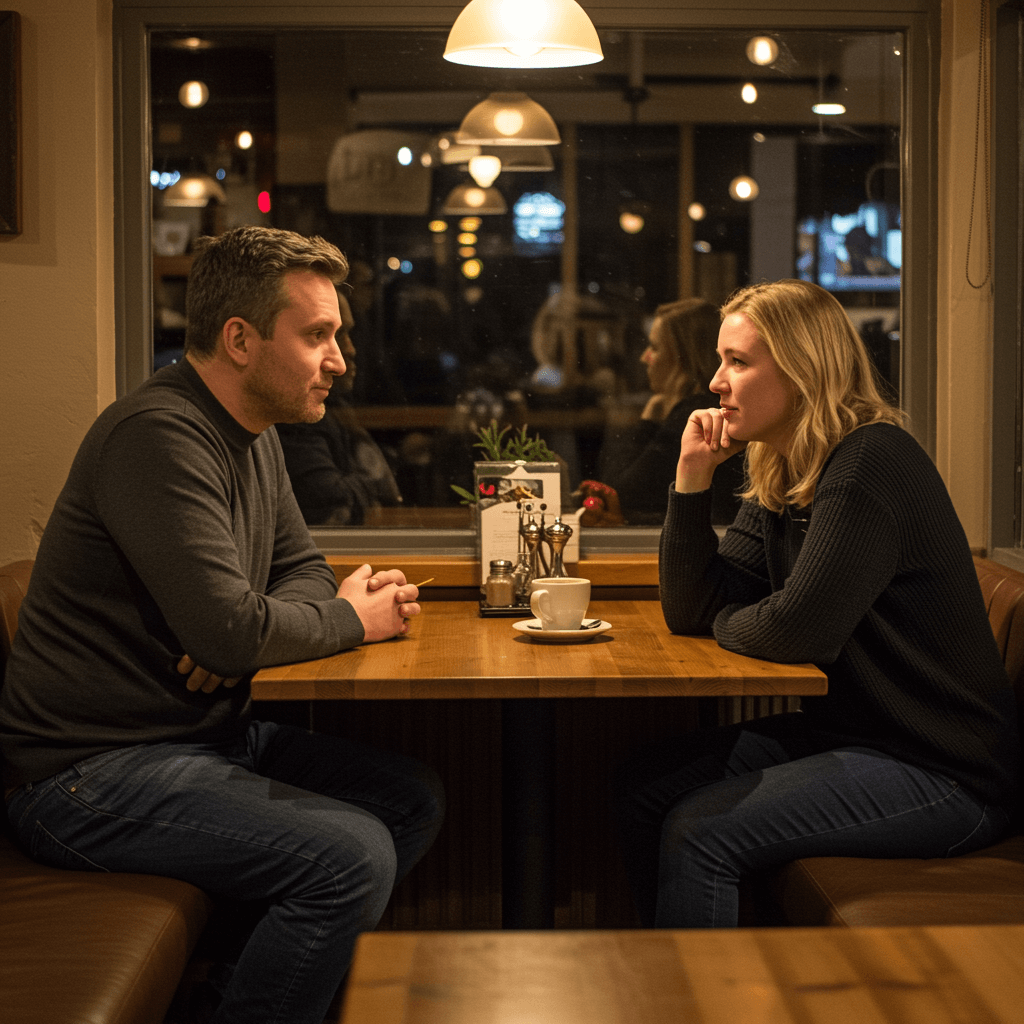When a friend abruptly cuts you off and you can’t figure out why, the simplest explanation might be that the person wasn’t a suitable friend for you to begin with. But if this keeps occurring—friend after friend disappearing—the pattern suggests something internal: a blind spot or an automatic behavior you repeat that wounds others and drives them away. Admitting that can be excruciating, so many people prefer to avoid it. Yet when your self-image is fragile, even contemplating that there’s something to work on can feel terrifying. Still, addressing it is crucial. Have you ever experienced this? Today’s letter comes from a woman who calls herself Mindy. She writes, “Dear Anna, briefly: I recently had a rupture with a friend of three years whom I thought of as a sister. We had sleepovers, quarantined together, exercised, traveled—I would have done anything for her. The split occurred after I set boundaries because I didn’t like how she treated me.” All right, time to mark a few things to revisit on a second read, but let’s unpack what’s happening with Mindy’s friendships. She continues, “This friend disclosed private things I’d confided to people she barely knew. She borrowed money and never paid it back. She relayed what others said about me, not in a protective or kind way but in a way that seemed designed to make me feel small, often weaponized to persuade me to dislike or turn on someone who’d upset her. When I established gentle but firm boundaries, she experienced them as rejection and expelled me—unfollowed, blocked on social media. Her whole family soon stopped talking to me. After our falling out I later learned she’s an extreme covert narcissist. What followed over two years was an ugly split with all the hallmarks of narcissistic abuse: smear campaigns, online doxxing, attempts to sabotage my job, triangulation and flying monkeys. It’s been two years and it breaks my heart that I was blind to how abusive the friendship was then and even after. I only started to recognize the patterns after spending two years on healing and examining the childhood wounds that made me attach to people like her and try to please them at any cost. This was a brutal awakening. I’m still shaken. My question is: how do I stop gaslighting myself into believing I deserved that? She triangulated and slandered me so thoroughly that while many people found it strange and didn’t believe her, some people I loved and respected did—how do I refuse to accept their view as correct? And crucially, how do I stop people-pleasing? I was driven mad trying to prove I’m not the person she painted me to be, and it unearthed all my childhood fawning patterns. I’m exhausted and feel betrayed a thousand times over.” That was the first letter, which arrived about a year ago. At the time my team and I decided not to read it on YouTube because it read as a straightforward account of someone else’s malicious behavior—“my friend was a terrible narcissist”—and I tend to focus on readers who see something within themselves to work on. I wrote back asking Mindy for more detail about what actually happened. The more recent letter shows she’s now noticing that something might be going on with her too. So the story deepens. She writes, “Dear Anna, I hope you get this. I feel like a total failure. Despite all my healing efforts, my interpersonal skills keep collapsing. Friends keep dropping away. The only stable relationship I have now is with my boyfriend, whom I worry might become codependent because of my pattern. I have a long history of people-pleasing and attracting people who either want me only to serve them or who I become overly enmeshed with. In just the last four months I’ve had falling-outs with three people—three people I once considered close—each after intense conversations. Each of them felt ‘wronged’ by me in different ways. As someone recovering from people-pleasing, I respond gently and openly to refuse to carry blame for what feels like projection and insecurity. I’m hyper-aware of not slipping back into codependent behaviors. I approach these talks calmly and try to explain that while I’m sorry they are hurt, it seems likely their reaction is projection because I experienced the events differently and do not believe I acted as they describe. Still, they discard me and block me on social media. How do I stop people-pleasing and absorbing others’ insecurities without dodging accountability? Am I the problem? Am I a narcissist? Am I expected to accept their accusations even when I didn’t do what they allege? What does genuine empathy look like? Part of me is trying to forge a new self; the old me is dying and the new one struggles to emerge. All my old attachments seem to be falling away; maybe I’ll eventually form new friendships and a new dynamic. But why do I activate this reaction in some people? I see them getting along with mutual friends fine—why is repair possible for them but not for me? Maybe I’m an easy target because I’m calm and tolerant—signs of trauma. I don’t know. I crave closeness, but everything feels risky now, and I find myself tempted to take refuge in solitude.” That’s Mindy’s second letter. In response, I asked her to give one or two concrete examples where a friend told her they were hurt and she labeled it projection—asking her to report exactly what they said they felt, not just her interpretation. She sent examples. The first: a friend who had supported her through a major difficulty went silent. Mindy texted to check if everything was okay or if this was just her anxiety. The friend replied she needed space and said Mindy had “triggered” her, and Mindy respected that request without probing what specifically triggered her. Weeks later they bumped into each other and the friend avoided her. Mindy greeted her warmly and kept things polite while socializing with others, feeling deeply wounded by the avoidance—asking for space is one thing, avoiding someone is another. After drinking a little, the friend confronted her angrily: “Are we going to talk or not?” Mindy offered to pick up where she’d asked about what was wrong, and the friend explained she was tired of playing therapist and that the previous day had been very hard for her. Mindy adds parenthetically that the earlier day had been a routine outing to the cinema during which she made an offhand joke about the difficult thing the friend had been supportive about. The friend accused Mindy’s energy of being negative and draining and said Mindy should be “an absolute Buddhist” about her issues—meaning, no joking at all—which left Mindy baffled. They agreed to arrange a proper conversation later, but despite repeated follow-ups Mindy was told the friend couldn’t meet and was wished luck, then blocked on social media. Example two: a former close collaborator she’d spoken with weekly on a project some years back; the project had been a success and both received recognition. Mindy tended to be proactive and took the lead, which the collaborator accepted; there was never a formal conversation about roles. Fast-forward to January of the previous year: the colleague sent a very long text claiming she couldn’t shake the feeling that Mindy had been dismissive during the project, saying she was disappointed Mindy lacked self-awareness and that the whole memory of the project was ruined for her because of Mindy’s attitude. The message was hard to read—confusing because it came so long after the project. Mindy replied apologizing that the friend felt that way and asking if she could extend some grace, suggesting another interpretation might be possible because Mindy remembered the collaboration fondly. The friend responded angrily, accusing Mindy of only talking about herself and saying the message wasn’t an apology, then blocked Mindy on social media. Understandably, Mindy was bewildered. In reading these letters, I hear a mix of things. Having been through situations where sometimes I was clearly wrong and sometimes I was the one being mistreated, it’s likely this is a combination for Mindy as well. Looking back at the first letter—before she was examining her own role—she focused on how the other person betrayed confidences, didn’t repay money, and spread gossip. Those are clear boundary violations by that friend. But consider this subtle point: a person who violates boundaries this way is also demonstrating that they may not hold certain boundaries themselves—like not passing on gossip, honoring confidences, or repaying money. So when you say you set “gentle but firm” boundaries and they were taken as rejection, that mismatch is important. If someone is being abusive, why rely only on gentle measures? What exactly you said and how you expressed it matters, and that detail is missing here—there may have been words or an approach that felt devastating to the other person. You also said you later learned the friend was an extreme covert narcissist—how was that determined? Through whom? When someone paints another person as irredeemably bad but doesn’t clarify their own part in the conflict, it raises the possibility there’s something hard to look at inside themselves. I say this with compassion. Smear campaigns do happen—I’ve had people attempt to destroy reputations and spread outrageous lies (I once had a neighbor insist I’d killed four cats when I only ever had one)—and that’s wild and damaging. But even when others behave terribly, it’s useful to explore what patterns you might be bringing to relationships. The more recent letter shows Mindy is turning inward, which is encouraging. Often the reality is mixed: if past trauma shapes how you connect, it will influence the kinds of people you attract—frequently other people who are themselves a bit unstable. There’s a common but disempowering thought people have: “I just attract narcissists,” as if it’s something that happens to them without choice. A different perspective is to reclaim agency: you have a role in whom you let into your life and who becomes close to you. If your relationships tend to be one-sided—people wanting you only for what you do for them, or relationships that leave you feeling used—that often points to not feeling confident in your own worth. Someone secure in themselves would typically withdraw at the first sign of being used. People with attachment wounds tend to hang on, rationalize, set boundaries gently, apologize, and keep trying. So a first priority is inner work to become someone you respect. There’s an approach I’ve seen help people: focus intently on the things you actually have control over—your patterns, choices, and the behaviors you repeat. If a pattern recurs, it usually springs from something within, which is good news because that means it can change with effort. Regarding the recent fallouts after intense conversations: that’s a major clue. It suggests the content or tone of those exchanges may escalate things. You emphasize that you deliver hard messages in a kind tone, but our nervous systems detect mismatch—the voice might be calm while the body language, energy, or underlying attitude communicates anger or contempt. Even if your words are truthful, telling someone they’re “projecting” or dismissing their feelings can land as invalidating or gaslighting. When a close relationship is at risk, it rarely helps to immediately assert that the other person is projecting. Even if that is accurate, the way it’s said can feel dismissive and provoke a defensive, irreparable reaction. If the goal is repair, aim to create a safe small container for honest, gentle conversation—one where you can be truthful without shutting down the other’s heart. You don’t have to be a doormat who accepts every accusation, but there are more constructive responses than “you’re projecting.” For instance, when someone says they’re hurt, instead of arguing facts right away, it’s often wiser to slow down and prioritize emotional listening: acknowledge their pain, ask for specifics, and invite them to help you understand. It takes courage to sit through a conversation when a portion of what someone says feels unfair and another part lands like a blow. Yet doing that emotional listening first—validating their pain—usually opens the door for later clarifications and a fairer airing of facts. Many people learn this in committed relationships: when a partner is hurting, pausing one’s own agenda to hear the pain often defuses conflict and increases the chances of being understood later. This is hard and takes practice. If you want concrete resources, the Gottman Institute has solid material on repairing relationships. There’s also an upcoming book called Connectability releasing October 7, 2025, that explores these skills in depth; in the meantime, a connection-focused bootcamp and membership community I’m involved with teach these practices, and people use those tools to form small groups and support each other through repair when feelings get hurt—so there is a place to practice these skills. You wrote about feeling like the old you is being weeded out and that new, better-matching friends will emerge. That can absolutely be true: after hard work, you’ll likely choose people whose dynamics align better with who you’re becoming. The friends you described in these letters—those who ghost abruptly or weaponize grievances—don’t sound like ideal long-term companions anyway. If you grew up with trauma, you and your friends will be quirky; you deserve grace and opportunities to repair. Improving your capacity for emotional listening will help you form those “connection muscles” I call connectability. Even if you don’t ultimately stay friends with someone after hearing them, practicing empathetic listening increases your chances of getting through ruptures without creating irreversible damage. The fear of having difficult conversations, combined with trauma-shaped choices about whom you befriend, produces the exact pattern you described: wanting to withdraw and be alone. That loneliness, while painful, can also be fertile ground for growth—when life quiets down you often change fastest because you have space to focus on healing. If any of this resonates and you suspect past trauma affects your ability to connect, there’s a free checklist I offer that outlines many signs to help you identify relevant patterns—it’s not a diagnosis, just a practical tool to see what shows up in your behavior and prioritize what to work on first. That download is available through the link below, and I’ll see you soon.”



 Was bedeutet es, wenn das Verlieren von Freunden ein Muster ist?">
Was bedeutet es, wenn das Verlieren von Freunden ein Muster ist?">






 Die 5 schockierenden Levels von Vermeidern beim Dating: Welches bist du?">
Die 5 schockierenden Levels von Vermeidern beim Dating: Welches bist du?">
 "Ich bin nicht traurig, dass er tot ist."">
"Ich bin nicht traurig, dass er tot ist."">
 Wie Trauma Bindungen Ihre Psychische Gesundheit Zertrümmern">
Wie Trauma Bindungen Ihre Psychische Gesundheit Zertrümmern">
 Stonewalling des Narzissten vermeiden.">
Stonewalling des Narzissten vermeiden.">
 Der letzte verzweifelte Zug, den Vermeider unternehmen, wenn sie sehen, dass Sie weitergehen">
Der letzte verzweifelte Zug, den Vermeider unternehmen, wenn sie sehen, dass Sie weitergehen">